The smell of Dgaj Muhshy (chicken stuffed with nutmeg, thyme, pine nuts, lamb and rice, and cooked with celery) taunted the nostrils. The old man was dressed in a shirt of bright yellow locally-made silk and was poking away among his vegetable garden as we got to the front door.
‘Hello,’ muttered Dalby. ‘The old swine is probably growing his own.’
The soft wind blew across the high-ceilinged dining-room. The décor, except for two beautiful gold thread brocades of very old Persian design, reflected Adem’s peasant origin more than his present-day affluence. The scrubbed woodwork, the small-patterned cloths, an enormous dresser, crowded with plates, saucers, jugs and cups. The rugs on the wall of simple dark-toned peasant weaves. All this provided a background against which a food opera was played out. First sambousiks (small pastries containing curried meat served freshly baked) were served. I looked at old Adem as he stood at the end of the table; under his bulbous nose hung an enormous grey moustache which, because of his thinning hair, gave one the curious feeling that his face was upside down. His skin was hard and tanned in such a way that when his face was relaxed and serious, the wrinkles around the mouth and eyes were white; but he was seldom serious.
He divided up the huge joint of lamb with a well-worn horn-sided folding knife that came from his pocket and was used in every operation from vegetable gardening to changing a tyre. I had watched him do both with the same smooth enjoyable efficiency. His mouth contorted with the effort of his hands, and each slice was delivered with a great flashing smile of his brown uneven teeth.
‘It’s good?’ he asked me.
I told him to be careful or he’d have a guest for life. It was the right thing to say. He was a born host and, as Dalby said, I am a born guest.
That afternoon as the sun reached its apogee Adem and I sat talking and drinking under the trees. Adem did the talking, I did the drinking. He told me of his uncle who had killed a lion single-handed with only a spear in 1928. ‘A challenge. He went to this lion in challenge. In his right hand he had a spear.’ Adem raised his right hand, fingers clenched. ‘This arm,’ he raised his left arm, ‘is tied with clothes and bandage for guarding.’ Adem demonstrated guarding. ‘After this lion die he is called “Hamid the lion-killer”; he never work again.’
‘Never works again?’
‘Never. A man who kills a lion, everyone gives him money and food, everything; never work again.’
‘I can see the attraction,’ I said. ‘Are there lions about here now?’
‘Not here. To the north perhaps; many times I go. Many animal; many gazelle, many leopard, ibex … bears. But they become less each year. Many people hunt.’
‘Like your Uncle Hamid.’
Adem looked serious, then he laughed a big laugh. ‘Not like him. People with guns. I do not like this.’
‘You go north hunting?’ Now I was doing it.
‘Not the hunt. I go to look. I stay very still, very, very still, near water, and I watch them come.’
‘You never photograph them?’
‘No, I watch. It is just for me, not for pictures. Just for me and the animal.’
I imagined Adem holed up overnight in the bleak brown area to the north watching and sniffing the night air and never taking a film or a bullet. I told him of Xenophon’s men who chased the ostrich and wild ass. He liked that part of the story but found the effort of imagining a greater period of time than two generations very difficult. As far as Adem was concerned, Xenophon was a contempary of A. W. Kinglake. Adem told me of the attempts to conserve the wild life farther north, and of the money they needed. When I told Dalby he said that the old man would do anything to get his hands on cash, but I’m simple enough to believe the old man.
Soon only the higher parts of the landscape were catching the horizontal sunlight and a lone blackcap had sung his song from all the little lemon trees. From inside the house the crick-crack of freshly ignited fruit-tree wood proclaimed the approach of dinner-time.
Totem poles of lamb, aubergine, onion and green pepper were being skewered, seasoned and readied on the big open hearth. As Adem finished speaking a radio somewhere within the house pierced the grey velvet twilight with a needle of sound.
The polished opening notes of the second movement of the Jupiter . It seemed that every living thing across the vast desert spaces heard the disturbing, chilling sound. For those few minutes of time as the wire edge modulated to a minor key and as the rhythm and syncopation caught, slipped and re-engaged like a trio on a trapeze, there was only me and Adem and Mozart alive in that cruel, dead, lonely place.
We were three days with the old man of the mountains, then John reappeared from Beirut with a vast radio set. It took him nearly three hours, but finally he made contact with a Battle-class RN destroyer that was NATOing down the Lebanese coastline.
Simon, the army quack, whose name was Painter, as far as anyone’s name is anything in this business, seldom came out of the upstairs room. But when they had fixed a rendezous time with the destroyer, Painter decided that the captive could eat dinner with us. Raven. He was well code-named this captive Raven. He was thinner and weaker than he’d looked even two days previously when Dalby had dragged him out of the Pontiac, but he was good-humoured in a different sort of way. His white shirt had grown a little dirty, and in his baggy pin-stripe trousers and a new dark linen jacket he looked like the manager of a Bingo saloon. His eyeballs, deep and darkly sunken, moved quickly and nervously, and I noticed that he repeatedly glanced towards Painter. As they reached the bottom of the stairs our guest paused. He seemed to sense our curiosity and interest in the role he played. Our chatter ceased, and the only sound came from an upstairs radio tuned to the ‘Voice of the Arab’; its strange polyphonic discord set the eerie background to the curious scene. His voice was the clear, carefully articulated tones of English management.
‘Good evening, gentlemen,’ he said flatly. ‘Good evening and er, thank you.’ He came through like a whisky ad. Dalby strode across to him in a paternal way, and led him to the table like guest night at Boodles. ‘Most kind, Dalby, most kind,’ he said.
All through the meal little was said that didn’t touch on the weather or the garden or horses, mostly horses, and old Adem finished quickly and went up to catch the forecast. The destroyer was making good time down the coast in the gathering twilight; visual contact wouldn’t be the simplest thing, although with fuel for over three hundred miles the helicopter had a safe enough margin of search.
They sat inside the big plexiglass dome of the SE-3130 Alouette 2 like goldfish expecting food. Simon Painter sat on one side of the azoic Raven on the folding seats in the rear. Dalby sat in the front left side observer’s seat as he received the final few words of Adem’s short lecture on the use of the Decca navigation equipment. Adem’s face was more serious now as he fingered the joystick-like cyclic pitch control, and worried about how to bring this Alouette down on the temporary landing platform that wouldn’t be much bigger than the forward gun turret upon which it was being erected at that minute. On the bodywork I could read the notices: ‘Danger Rotors’ and a serial number, and inside the cabin a small plastic panel and engraved upon it the procedure in case of fire. The words shuddered as the motor started. Like a back-fire in Trafalgar Square it was followed by the sound of a thousand wings beating the air, clattering across the valley and echoing back to us again. The 400-horse-power Turbomeca power unit was alive, and above my head the thirty-foot rotor-blades shaved the face of the night. The controls reflected little pimples of yellow light into Adem’s spectacles, and our distinguished visitor waved a limp hand airily towards us in kingly fashion. ‘Farewell troublesome Raven,’ I thought.
Читать дальше












